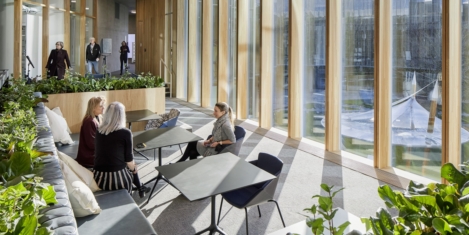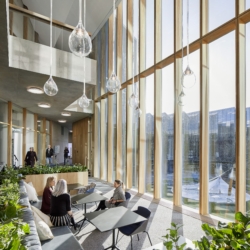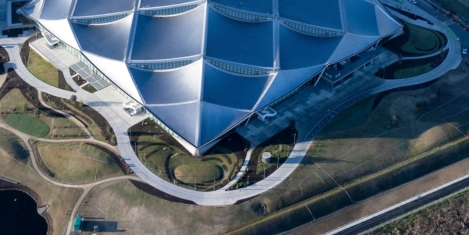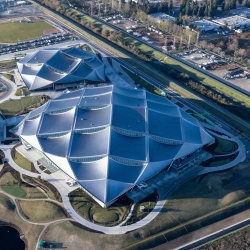To provide the best experiences, we use technologies like cookies to store and/or access device information. Consenting to these technologies will allow us to process data such as browsing behaviour or unique IDs on this site. Not consenting or withdrawing consent, may adversely affect certain features and functions.
The technical storage or access is strictly necessary for the legitimate purpose of enabling the use of a specific service explicitly requested by the subscriber or user, or for the sole purpose of carrying out the transmission of a communication over an electronic communications network.
The technical storage or access is necessary for the legitimate purpose of storing preferences that are not requested by the subscriber or user.
The technical storage or access that is used exclusively for statistical purposes.
The technical storage or access that is used exclusively for anonymous statistical purposes. Without a subpoena, voluntary compliance on the part of your Internet Service Provider, or additional records from a third party, information stored or retrieved for this purpose alone cannot usually be used to identify you.
The technical storage or access is required to create user profiles to send advertising, or to track the user on a website or across several websites for similar marketing purposes.
 The UK Green Building Council – which represents some of the UK’s biggest names in the built environment, including housebuilders, banks, social housing providers, local councils, developers, estates and engineering companies and universities – responds to the Scottish Government’s decision to scrap its 2030 climate target. (more…)
The UK Green Building Council – which represents some of the UK’s biggest names in the built environment, including housebuilders, banks, social housing providers, local councils, developers, estates and engineering companies and universities – responds to the Scottish Government’s decision to scrap its 2030 climate target. (more…)




















 The focus on creating a more sustainable workplace is increasing. Many designers, specifiers, manufacturers, suppliers and, of course, users are pledging their allegiance to the cause. Some are driven by a genuine recognition of the climate crisis whilst others are appreciating that commercially, it’s an essential direction. ‘Zero to landfill’ has been given ‘green bragging rights’ for some time. In reality, due to the significantly lower cost of incineration versus recycling, most material isn’t reclaimed, it is burnt. Whilst ‘energy from waste’ might alleviate some guilt, it is still contributing to pollution.
The focus on creating a more sustainable workplace is increasing. Many designers, specifiers, manufacturers, suppliers and, of course, users are pledging their allegiance to the cause. Some are driven by a genuine recognition of the climate crisis whilst others are appreciating that commercially, it’s an essential direction. ‘Zero to landfill’ has been given ‘green bragging rights’ for some time. In reality, due to the significantly lower cost of incineration versus recycling, most material isn’t reclaimed, it is burnt. Whilst ‘energy from waste’ might alleviate some guilt, it is still contributing to pollution. 
 At 6.31 a.m. on Tuesday, December 8, 2020, the UK became the first country in the world to administer the COVID-19 vaccine. Just over five months earlier, I had been deployed to the NHS England and NHS Improvement COVID-19 vaccination programme to help drive the highly complex design and planning needed to bring the nation to this point. My role involved leading the set up and embedding of the Estates, Equipment, Consumables and Logistics workstream. The purpose of this was to establish and combine the new and existing infrastructure required in England to manage the distribution, regulation and administration of multiple vaccines so that all systems would be ready to vaccinate on the ‘go-live’ date.
At 6.31 a.m. on Tuesday, December 8, 2020, the UK became the first country in the world to administer the COVID-19 vaccine. Just over five months earlier, I had been deployed to the NHS England and NHS Improvement COVID-19 vaccination programme to help drive the highly complex design and planning needed to bring the nation to this point. My role involved leading the set up and embedding of the Estates, Equipment, Consumables and Logistics workstream. The purpose of this was to establish and combine the new and existing infrastructure required in England to manage the distribution, regulation and administration of multiple vaccines so that all systems would be ready to vaccinate on the ‘go-live’ date. 
 It is now a truism that society expects more of business than merely maximising shareholder value.
It is now a truism that society expects more of business than merely maximising shareholder value. 
 The way in which we work has changed in a way no one would have ever predicted as a result of last year’s pandemic. Consequently, many businesses have chosen to adopt to an agile working practise. This coupled with the rapid evolution of the hybrid workplace has allowed more employees than ever the flexibility to work from home, many people however still crave that interaction with colleagues, and the ‘corridor conversations’ that cannot be replicated via Zoom and can only happen with workplace collaboration.
The way in which we work has changed in a way no one would have ever predicted as a result of last year’s pandemic. Consequently, many businesses have chosen to adopt to an agile working practise. This coupled with the rapid evolution of the hybrid workplace has allowed more employees than ever the flexibility to work from home, many people however still crave that interaction with colleagues, and the ‘corridor conversations’ that cannot be replicated via Zoom and can only happen with workplace collaboration. 








February 28, 2024
What do we need offices for anyway? The Greeks had a word for it
by Mark Eltringham • Comment, Workplace design